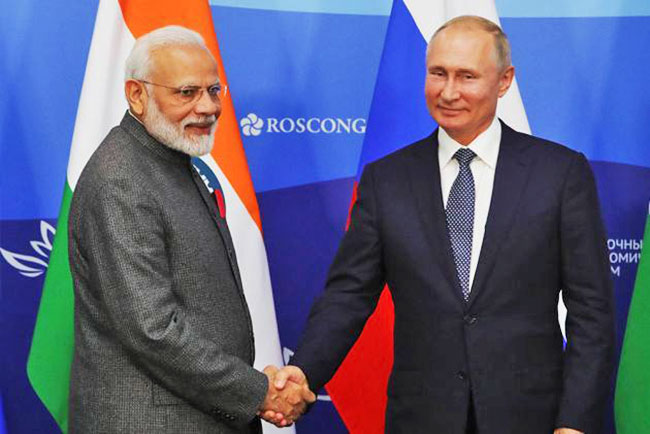|
by Carl Jaison from TheDiplomat Website
India and Russia could generate a "third order" - outside the constraints of
either the
United States or China...
Greater Indo-Russian cooperation should seem like a foregone conclusion.
New Delhi and Moscow could benefit greatly from strategic alignment given the current geopolitical rivalry unfolding in the Asian theater between Beijing and Washington.
While China has little
reason to draw down its military presence in the Indo-Pacific,
the United States continues to
attempt to bring together like-minded countries to check China's
moves.
Moreover, India has carefully broached the issue by avoiding overt anti-China posturing in the region.
Thus, for India, the
Indo-Pacific strategy comprises largely of either cooperative or
coercive engagement.
Even in the context of the Indo-Pacific, Russia is playing its cards deftly as it re-examines its ties with various actors like ASEAN in the region (see Reenergizing the Russia-ASEAN Relationship - The Eurasian Opportunity).
Given the current
emphasis on building capacity in its Far East, Russia has its own
vested interest in creating linkages between the Indian Ocean and
the North Pacific Ocean.
In the Indo-Pacific, India and Russia have carved out a unique strategy to amplify their own machinations.
While New Delhi has sought to break free from the U.S.-China geopolitical rivalry in the region, Moscow has come up with a compelling strategy in the form of the Eastern Economic Forum to build strategic relationships with Asian countries to limit its reliance on China.
Meanwhile, in
Afghanistan, India might have reservations about the Taliban's rise
to prominence at the expense of the democratically elected
government in Kabul but having Russia as a channel to influence the
Taliban after a U.S. withdrawal could play to India's favor.
This works in Russia's interests, as it should know better than to put all its eggs in the Chinese basket. Despite their growing bonhomie, Russia is better off considering expanding its ties with other Asian countries like,
...than solely
piggybacking on China in matters relating to the Far East, Central
Asia, and Asia as a whole.
The U.S.-led order encapsulated in,
...has resulted in multiple disruptions in the wide Asian region.
Further, the China-led
order has sustained in its own disruptive ways from the Indo-Pacific
(South China Sea dispute) to Afghanistan (strategic leverage over
Pakistan) to its U.S. strategy (again, through the trade war).
Moreover, the third order is reflective of the geopolitical realities in the region, based on a multi-polar, rules-based, mutually beneficial framework. Given the enduring shadow of the Sino-U.S. rivalry, India, and Russia have their task cut out in framing this third narrative.
However, the continuing relevance of such an order would be tested against the strategic necessity of the Indo-Russian cooperation.
If the strengths of the
partnership are carried forward in the times to come, it would not
only elevate their bilateral ties to a new level, but offer a
refreshingly fresh perspective on how issues in the region are
addressed...
|


